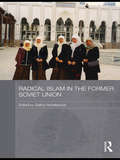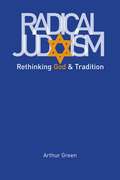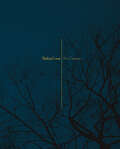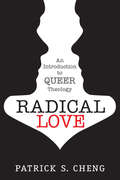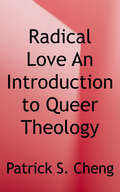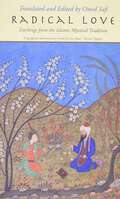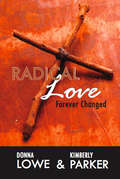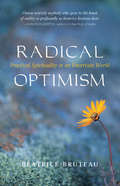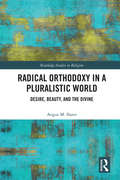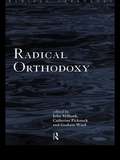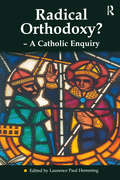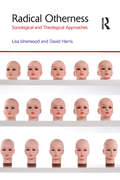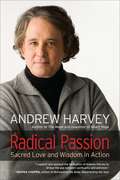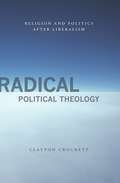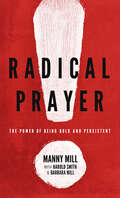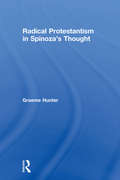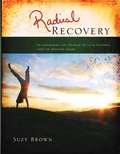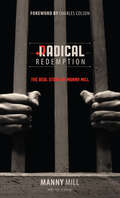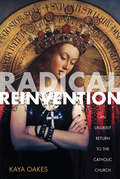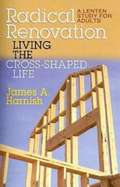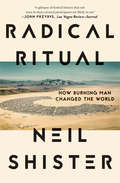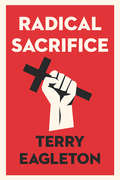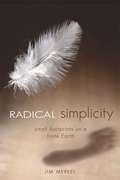- Table View
- List View
Radical Islam in the Former Soviet Union (Routledge Contemporary Russia and Eastern Europe Series)
by Galina M. YemelianovaThis is the first comprehensive and comparative examination of Islamic radicalisation in the Muslim regions of the former Soviet Union since the end of Communism. Since the 1990s, the ex-Soviet Muslim Volga-Urals, Caucasus and Central Asia have been among the most volatile and dynamic zones of Islamic radicalisation in the Islamic East. Although partially driven by a wider Islamic resurgence which began in the late 1970s in the Middle East, the book argues that radicalisation is a post-Soviet phenomenon triggered by the collapse of Communism, and the break-up of the de facto unitary Soviet empire. The book considers the considerable differences in perceptions and manifestations of radical Islam in the republics, as well as the level of its doctrinal and political impact. It demonstrates how the particular histories of the regions’ Muslim peoples - especially the length and depth of their Islamisation - have influenced the nature and scope of their radicalisation. Other significant factors include the mobilising power of the global jihadist network, and most significantly the level of social and economic hardship. Based on extensive empirical research including interviews with leading members of the political and religious elite, the Islamist opposition as well as ordinary muslims, the book reveals how unofficial radical Islam has turned into a potent ideology of social mobilisation. It identifies the different dynamics at work and how these relate to each other, assesses the level of foreign involvement and evaluates the implications of the rise of Islamic radicalism for particular post-Soviet states, post-Soviet Eurasia and the wider international community.
Radical Judaism: Rethinking God and Tradition
by Arthur GreenHow do we articulate a religious vision that embraces evolution and human authorship of Scripture? Drawing on the Jewish mystical traditions of Kabbalah and Hasidism, path-breaking Jewish scholar Arthur Green argues that a neomystical perspective can help us to reframe these realities, so they may yet be viewed as dwelling places of the sacred. In doing so, he rethinks such concepts as God, the origins and meaning of existence, human nature, and revelation to construct a new Judaism for the twenty-first century.
Radical Love
by Toni GreavesA photojournalist documents a young woman’s journey as joins a New Jersey convent to become a nun.The sudden revelation of a powerful religious calling was an entirely unexpected event in the life of a college student named Lauren. But when it became clear to her that she had a spiritual vocation, she made the exceptional decision to dedicate her life to God. Drawing upon many visits to the cloistered religious community of Dominican nuns in Summit, New Jersey, photographer Toni Greaves has created a luminous body of work that follows the transformative journey by which Lauren became Sister Maria Teresa of the Sacred Heart. These meditative photographs capture the radical joy of a life dedicated unequivocally to love.“Toni Greaves’s luminous images marry the quotidian with the divine in all sorts of ways: a young novice dribbles a basketball in full habit; a jar of Vick’s VapoRub nestles a bottle of holy water; a group portrait of all 19 sisters, whose ages range from 25 to 90, includes Sabina, the golden retriever, splayed flat on the floor.” —New York Times
Radical Love: An Introduction to Queer Theology
by Patrick S ChengAn exploration of the teachings of Jesus in relation to the LGBTQ community that “helps readers welcome a theology that leaves no one behind” (Chris Glaser, author of Coming Out as Sacrament). A common claim, on both on the political right and left, is that Christianity is incompatible with queerness. As this first book on the subject of queer theology insightfully argues, Jesus Christ can be understood by lesbian, gay, bisexual, and transgender people as the embodiment of a love so extreme that it dissolves all existing boundaries. In discussing revelation, God, Trinity, creation, atonement, sin, grace, Holy Spirit, church, and sacraments, Patrick Cheng—a theologian, seminary professor, and ordained minister—provides a historical survey of how queer theology has developed from the 1950s to today, and then illuminates its themes using the ecumenical creeds as his guide. He discusses Jesus’s communion with all people—holy and profane. He explores Jesus’s crossing of all barriers—from Divine to sexual. Above all, he reminds us that those barriers are societal, rather than religious, concepts. “An excellent introduction for beginners and an excellent synthesis for more advanced readers." —Virginia Ramey Mollenkott, author of Sensuous Spirituality
Radical Love: An Introduction to Queer Theology
by Patrick S. ChengContextual theologies have developed from a number of perspectives - including feminist theology, black theology, womanist theology, Latin American liberation theology, and Asian American theology - and a wide variety of academic and general introductions exist to examine each one. However, Radical Love is the first introductory textbook on the subject of queer theology. In this lucid and compelling introduction, Cheng provides a historical survey of how queer theology has developed from the 1950s to today and then explicates the themes of queer theology using the ecumenical creeds as a general framework. Topics include revelation, God, Trinity, creation, Jesus Christ, atonement, sin, grace, Holy Spirit, church, sacraments, and last things, as seen through the lenses of LGBT theologians.
Radical Love: Teachings From The Islamic Mystical Tradition
by Omid SafiThis stunning collection showcases the love poetry and mystical teachings at the heart of the Islamic tradition in accurate and poetic original translations <p><p> At a time when the association of Islam with violence dominates headlines, this beautiful collection offers us a chance to see a radically different face of the Islamic tradition. It traces a soaring, poetic, popular tradition that celebrates love for both humanity and the Divine as the ultimate path leading humanity back to God. <p><p> Safi brings together for the first time the passages of the Qur’an sought by the Muslim sages, the mystical sayings of the Prophet, and the teachings of the path of “Divine love.” Accurately and sensitively translated by leading scholar of Islam Omid Safi, the writings of Jalal al‑Din Rumi can now be read alongside passages by Kharaqani, ‘Attar, Hafez of Shiraz, Abu Sa‘id‑e Abi ’l‑Khayr, and other key Muslim mystics. For the millions of readers whose lives have been touched by Rumi’s poetry, here is a chance to see the Arabic and Persian traditions that produced him.
Radical Love…Forever Changed
by Donna Lowe Kimberly ParkerRadical Love...Forever Changed brings truth to the misconceptions that prevent you from loving God's way. You don't have to wait for your circumstances or for others to change. You will see clearly the distortions between how the world views love and how the Bible defines it. In this book you will discover the enabling power of the Holy Spirit. When you have been radically changed by His love, you are fully equipped to give it to others. By tackling tough subjects (or spicy meatballs) like control, trust, envy, blame, unforgiveness, anger, and pride; you will identify and know how to blow up the barriers that make it difficult to really love others. It is time for you to stop wishing things were different and for things to be different. The journey begins with truth.
Radical Optimism: Practical Spirituality in an Uncertain World
by Beatrice BruteauThe pioneering spiritual scholar discusses how to find genuine optimism in times of crisis by contemplating the ultimate reality of God.Dr. Beatrice Bruteau was an inspiration to some of the most influential spiritual thinkers of our time. With a background in Vedanta, Catholic contemplation, and the natural sciences, she developed a broadly inclusive, interspiritual vision of human reality. In Radical Optimism she shines new light on the deepest truth we can know about ourselves: each of us is one with God, here and now. In a series of essays exploring the concepts of Leisure, Stillness, and Meditation—as well as examining the distinctions between the Finite and the Infinite and Sin and Salvation—Bruteau offers a path to recognizing our own unity with God. She provides a blueprint for understanding it, knowing the happiness it brings, and cultivating a contemplative consciousness amid the hectic uncertainty of daily life.
Radical Orthodoxy in a Pluralistic World: Desire, Beauty, and the Divine (Routledge Studies in Religion)
by Angus M. SlaterRadical Orthodoxy remains an important movement within Christian theology, but does it relate effectively with an increasingly pluralist and secular Western society? Can it authentically communicate the beauty and desire of the divine to such a diverse collection of theological accounts of meaning? This book re-assesses the viability of the social model given by John Milbank, before attempting an out-narration of this vision with a more convincing account of the link between the example of the Trinitarian divine and the created world. It also touches on areas such as interreligious dialogue, particularly between Christianity and Islam, as well as social issues such as marginalisation, integration, and community relations in order to chart a practical way forward for the living of a Christian life within contemporary plurality. This is a vital resource for any Theology academic with an interest in Radical Orthodoxy and conservative post-modern Christian theology. It will also appeal to scholars involved in Islamic Studies and studying interreligious dialogues.
Radical Orthodoxy: A New Theology (Routledge Radical Orthodoxy)
by Graham Ward John Milbank Catherine PickstockRadical Orthodoxy is a new wave of theological thinking that aims to reclaim the world by situating its concerns and activities within a theological framework, re-injecting modernity with theology.This collection of papers is essential reading for anyone eager to understand religion, theology, and philosophy in a completely new light.
Radical Orthodoxy? - A Catholic Enquiry
by Laurence Paul HemmingRadical Orthodoxy? A Catholic Enquiry is essential reading for anyone seeking to understand 'Radical Orthodoxy', or be in critical dialogue with it. John Milbank, Catherine Pickstock and Graham Ward, the three principal exponents of Radical Orthodoxy, each enter into dialogue with theologians from the Catholic tradition - a tradition with whose sources and current researches Radical Orthodoxy claims to have much in common. The Introduction explores the issues and tensions involved in Radical Orthodoxy's dialogue with Catholic theology, and David Burrell offers an important evaluation of Radical Orthodoxy in the context of North America. In the first dialogue John Milbank presents one of the clearest expositions of the Radical Orthodoxy programme to date; Fergus Kerr's reply discusses this programme in the wider context of post-war Catholic debate. Catherine Pickstock explores the work of Aquinas to show how Radical Orthodoxy is appropriating the work of past theological giants, and in reply Laurence Hemming asks what questions remain in that process. Graham Ward, Oliver Davies and Lucy Gardner debate the challenges facing contemporary theology, both from the past and the postmodern present. James Hanvey's provocative conclusion opens the way to future debate. Challenging, yet accessibly written, this book represents an important milestone in the critical reception of Radical Orthodoxy. Shedding new light on contemporary issues and current theological enquiry, this book offers important insights to students of theology and those training for ministry, clergy and informed lay people, and everyone who wants to make sense of one of the most demanding yet important debates currently taking place.
Radical Otherness: Sociological and Theological Approaches (Gender, Theology and Spirituality)
by David Harris Lisa IsherwoodThe problem of otherness is central to debates in both the social sciences and theology. To define the other – by colour, gender, politics, nationality, or religion – is to define the self. Othering has been used through history as a justification for boundary-setting, for conflict and for oppression. Radical Otherness presents a broad overview of otherness in both sociology and theology. The book reveals how social theory can illuminate many contemporary issues in theology, whilst the examination of theological methods can shed light on problematic issues in sociology. The discussion of issues in Radical Otherness moves from the personal to the political, to the hermeneutic, to the ultimate otherness of metaphysics. At each stage, discussion of theory is grounded in concrete examples. The book offers students of ethics, theology, and sociology of religion a clear and engaged assessment of otherness, and opens up new ways for investigating a concept central to the study of both religion and society.
Radical Passion: Sacred Love and Wisdom in Action
by Andrew HarveyThis culmination of award-winning author Andrew Harvey's life's work bridges the great divide between spiritual resignation and engaged spiritual activism. A manifesto for the transformation of the world through the fusion of deep mystical peace with the clarity of radical wisdom, it is a wake-up call to put love and compassion to urgent, focused action. According to Harvey, we are in a massive global crisis reflected by a mass media addicted to violence and trivialization at a moment when what the world actually needs is profound inspiration, a return to the heart-centered way of the Divine Feminine, the words of the mystics throughout the ages, and the cultivation of the nonviolent philosophies of Gandhi, Nelson Mandela, Aung San Suu Kyi, and the Dalai Lama. Harvey's concepts of radical passion and sacred activism fly in the face of restraint, of pessimism, of denial, of all that is inhumane, fusing the mystic's passion for God with the activist's passion for justice and for healing the division between heaven and earth, heart and will, body and soul, prayer and action. Sacred activism asks that we engage deeply on a personal, spiritual, and political level so as to become a fully empowered, fully active, and contemplative humanity that can turn tragedy into grace, and desolation into the opportunity to build and co-create a new world. Unlike many spiritual books, Radical Passion does not veil the dark with artificial hope. It explores the catastrophes of our current times and celebrates the ecstatic hope and divinity that is possible--right now and in the future.From the Trade Paperback edition.
Radical Political Theology: Religion and Politics After Liberalism (Insurrections: Critical Studies in Religion, Politics, and Culture)
by Clayton CrockettIn the 1960s, the strict opposition between the religious and the secular began to break down, blurring the distinction between political philosophy and political theology. This collapse contributed to the decline of modern liberalism, which supported a neutral, value-free space for capitalism. It also deeply unsettled political, religious, and philosophical realms, forced to confront the conceptual stakes of a return to religion.Gamely intervening in a contest that defies simple resolutions, Clayton Crockett conceives of the postmodern convergence of the secular and the religious as a basis for emancipatory political thought. Engaging themes of sovereignty, democracy, potentiality, law, and event from a religious and political point of view, Crockett articulates a theological vision that responds to our contemporary world and its theo-political realities. Specifically, he claims we should think about God and the state in terms of potentiality rather than sovereign power. Deploying new concepts, such as Slavoj i ek's idea of parallax and Catherine Malabou's notion of plasticity, his argument engages with debates over the nature and status of religion, ideology, and messianism. Tangling with the work of Derrida, Deleuze, Spinoza, Antonio Negri, Giorgio Agamben, Alain Badiou, John D. Caputo, and Catherine Keller, Crockett concludes with a reconsideration of democracy as a form of political thought and religious practice, underscoring its ties to modern liberal capitalism while also envisioning a more authentic democracy unconstrained by those ties.
Radical Prayer: The Power of Being Bold and Persistent
by Manny M. MillWhat if we prayed how Jesus taught us to? Many of us pray with little heart. We mutter the usual and leave with little expectation. But is this how Jesus taught us to pray? The Lord&’s Prayer is a prayer according to God&’s will, a prayer that beckons heaven to crash into earth. Tied to the sure promises of God, it compels us to seek—and expect—His glory in every sphere. When one prays consistently, persistently, and boldly for the hallowing of God&’s holy name, big things happen. Radical Prayer gives us a glimpse of the transformative and explosive power of praying in God&’s will, a power that takes place internally and manifests externally. Whether your prayer life is strong or in shambles, Radical Prayer will compel you to a life of bold, persistent, transformative, and expectant prayer.
Radical Prayer: The Power of Being Bold and Persistent
by Manny M. MillWhat if we prayed how Jesus taught us to? Many of us pray with little heart. We mutter the usual and leave with little expectation. But is this how Jesus taught us to pray? The Lord&’s Prayer is a prayer according to God&’s will, a prayer that beckons heaven to crash into earth. Tied to the sure promises of God, it compels us to seek—and expect—His glory in every sphere. When one prays consistently, persistently, and boldly for the hallowing of God&’s holy name, big things happen. Radical Prayer gives us a glimpse of the transformative and explosive power of praying in God&’s will, a power that takes place internally and manifests externally. Whether your prayer life is strong or in shambles, Radical Prayer will compel you to a life of bold, persistent, transformative, and expectant prayer.
Radical Protestantism in Spinoza's Thought
by Graeme HunterSpinoza is praised as a father of atheism, a precursor of the Enlightenment, an 'anti-theologian' and a father of political liberalism. When the religious dimension of Spinoza's thought cannot be ignored, it is usually dismissed as some form of mysticism or pantheism. This book explores the positive references to Christianity presented throughout Spinoza's works, focusing particularly on the Tractatus Theologico-politicus. Arguing that advocates of the anti-Christian or un-Christian Spinoza fail to look beyond Spinoza's ethics, which has the least to say about Christianity, Graeme Hunter offers a fresh interpretation of Spinoza's most important works and his philosophical and religious thought.  While there is no evidence that Spinoza became a Christian in any formal sense, Hunter argues that his aim was neither to be heretical nor atheistic, but rather to effect a radical reform of Christianity and a return to simple Biblical practices. This book presents a unique contribution to current debate for students and specialist scholars in philosophy of religion, the history of philosophy and early modern history.
Radical Recovery: Transforming the Despair of Your Divorce into an Unexpected Good
by Suzy BrownThis book is a manual for divorce recovery. The author writes: "Wherever you are on the mid-life divorce trail, take a deep breath and realize there is a plan for you after divorce. Radical Recovery is a resource guide to help you survive those first awful days, weeks, months, and, of course, all the nights of a mid-life divorce."The goal of this book is not just survival, it's life-transformation. Suzy writes: "You can change absolutely everything in your life for the better. In spite of your divorce, there is a destiny for you beyond your wildest dream. Believe that truth and get your new life started today."
Radical Redemption: The Real Story of Manny Mill
by Manny Mill"The life and ministry of Manny Mill is another evidence that a reformed vision of God&’s sovereign grace ignites radical, risk-taking ministries of mercy, not passive fatalism. May his story set ten thousand captives free—including those who have never been in prison." — John Piper, founder, Desiring God Ministries---------------------------------------------------------------&“I could have been dead so many times. I always spent more money than I had, I was always in over my head, and I was always involved in too many things at one time…Everything I did was with me in mind.&” — Manny MillDescending into a life of debauchery, Manny Mill found himself teetering on the edge of personal and financial disaster. In this candid and vividly personal book, Manny tells how His pursuit of pleasure led him to the depths of human despair. A declared fugitive of the law, he was running from the FBI when he ran into Christ and a life of radical redemption. Manny&’s experiences will thrill you. His faith will inspire you. And his words will challenge you to think about your life, your relationship with the God of the universe, and your own need for a radical redemption.
Radical Redemption: The Real Story of Manny Mill
by Manny Mill"The life and ministry of Manny Mill is another evidence that a reformed vision of God&’s sovereign grace ignites radical, risk-taking ministries of mercy, not passive fatalism. May his story set ten thousand captives free—including those who have never been in prison." — John Piper, founder, Desiring God Ministries---------------------------------------------------------------&“I could have been dead so many times. I always spent more money than I had, I was always in over my head, and I was always involved in too many things at one time…Everything I did was with me in mind.&” — Manny MillDescending into a life of debauchery, Manny Mill found himself teetering on the edge of personal and financial disaster. In this candid and vividly personal book, Manny tells how His pursuit of pleasure led him to the depths of human despair. A declared fugitive of the law, he was running from the FBI when he ran into Christ and a life of radical redemption. Manny&’s experiences will thrill you. His faith will inspire you. And his words will challenge you to think about your life, your relationship with the God of the universe, and your own need for a radical redemption.
Radical Reinvention: An Unlikely Return to the Catholic Church
by Kaya OakesAs someone who clocked more time in mosh pits and at pro-choice rallies than kneeling in a pew, Kaya Oakes was not necessarily the kind of Catholic girl the Vatican was after. But even while she immersed herself in the punk rock scene and proudly called herself an atheist, something kept pulling her back to the religion of her Irish roots.After running away from the Church for thirty years, Kaya decides to return. Her marriage is under stress, her job is no longer satisfying, and with multiple deaths in her family, a darkness looms large. In spite of her frustration with Catholic conservatism, nothing brings her peace like Mass. After years of searching to no avail for a better religious fit, she realizes that the only way to find harmony-in her faith and her personal life-is to confront the Church she'd left behind.Rebellious and hypercritical, Kaya relearns the catechisms and achieves the sacraments, all while trying to reconcile her liberal beliefs with contemporary Church philosophy. Along the way she meets a group of feisty feminist nuns, a "pray-and-bitch" circle, an all-too handsome Italian priest, and a motley crew of misfits doing their best to find their voices in an outdated institution.This is a story of transformation, not only of Kaya's from ex-Catholic to amateur theologian, but ultimately of the cultural and ethical pushes for change that are rocking the world's largest religion to its core.
Radical Renovation - eBook [ePub]: Living the Cross-Shaped Life
by Rev James A. HarnishRadical Renovation: Living the Cross-Shaped LifeA Lenten Study for AdultsJames A. HarnishRadical Renovation is a powerful image of what can happen in our lives during the season of Lent. Just as a house can be rebuilt after it has fallen into disrepair or devastation, author James A. Harnish says, so God can enter in to our brokenness and completely rebuild our lives, so that we can become the kind of people in whom the living Christ can take up residence, and through whom the loving purpose of God can become a tangible reality in this world. As the great cathedrals were built in the shape of a cross, the author tells us, the traditional Lenten disciplines invite us to allow the Spirit of God to reshape the way we think, act, and live into the likeness of Jesus on his way to the cross. This seven-session study, appropriate for both group and individual use, will provide one lesson for each week in Lent. Each lesson includes a Scripture reference, a brief reflection, questions for discussion or reflection, a brief prayer, and a focus for the coming week. JAMES A. HARNISH is senior pastor of Hyde Park United Methodist Church in Tampa, Florida. He is the author of Journey to the Center of the Faith: An Explorer’s Guide to Christian Living; Passion, Power & Praise: A Model for Men’s Spirituality from the Life of David; and You Only Have to Die: Leading Your Congregation to New Life, and he served as a contributor to both 365 Meditations for Young Adults and 365 Meditations for Men.Chapter titles and key Scripture verses:“Discipleship: Living the Cross-Shaped Life” Mark 8:27-38“Servanthood: A Peculiar Way to Greatness” Mark 9:33-37; 10:35-45“Surrender: Nothing Short of Everything” Mark 10:17-34“Forgiveness: Rebuilding Damaged Relationships” Mark 11:25-26; Luke 23:32-34 “Love: The Radical Center” Mark 12:28-34“Sacrifice: It’s Nothing if It Costs Nothing” Mark 14:1-19“Hope: He Goes Before You!” Mark 16:1-8
Radical Ritual: How Burning Man Changed the World
by Neil Shister"Neil Shister's book skillfully traces the evolution of Burning Man and provides rare insights into how this cultural phenomenon is changing the world." —Michael Mikel, founding board member of the Burning Man ProjectWritten from Neil Shister’s perspective as a journalist, student of American culture, and six–time participant in Burning Man, Radical Ritual presents the event as vitally, historically important. Shister contends that Burning Man is a significant player in the avant–garde, forging new social paradigms as liberal democracy unravels. Burning Man’s contribution to this new order is postmodern, a fusion of sixties humanism with state–of–the–art Silicon Valley wizardry.Shister is not alone in his opinion. In 2018, the Smithsonian dedicated its entire Renwick Gallery, located next door to the White House, to an exhibition of Burning Man art and culture. The festival intertwines conservative and progressive ideas. On one hand it is a celebration of self–reliance, personal accountability, and individual freedom; on the other hand it is based on strong values of inclusion, consensual decision making, and centered, collaborative endeavor.In a wonderful mix of narrative storytelling and reportage, Radical Ritual discusses how Burning Man has impacted the art world, disaster relief, urban renewal, the utilization of renewable energy, and even the corporate governance of Google. The story concludes with the sudden death in April 2018 of Larry Harvey, now renowned as the philosophical epicenter of the movement.
Radical Sacrifice
by Terry EagletonA trenchant analysis of sacrifice as the foundation of the modern, as well as the ancient, social order The modern conception of sacrifice is at once cast as a victory of self-discipline over desire and condescended to as destructive and archaic abnegation. But even in the Old Testament, the dual natures of sacrifice, embodying both ritual slaughter and moral rectitude, were at odds. In this analysis, Terry Eagleton makes a compelling argument that the idea of sacrifice has long been misunderstood. Pursuing the complex lineage of sacrifice in a lyrical discourse, Eagleton focuses on the Old and New Testaments, offering a virtuosic analysis of the crucifixion, while drawing together a host of philosophers, theologians, and texts—from Hegel, Nietzsche, and Derrida to the Aeneid and The Wings of the Dove. Brilliant meditations on death and eros, Shakespeare and St. Paul, irony and hybridity explore the meaning of sacrifice in modernity, casting off misperceptions of barbarity to reconnect the radical idea to politics and revolution.
Radical Simplicity
by Jim MerkelImagine you are first in line at a potluck buffet. The spread includes not just food and water, but all the materials needed for shelter, clothing, healthcare, and education. How do you know how much to take? How much is enough to leave for your neighbors behind you--not just the six billion people, but the wildlife, and the as-yet-unborn? In the face of looming ecological disaster, many people feel the need to change their own lifestyles as a tangible way of transforming our unsustainable culture. Radical Simplicity is the first book that guides the reader to a personal sustainability goal, then offers a process to monitor progress to a lifestyle that is equitable amongst all people, species, and generations. It employs three tools to help readers begin their customized journey to simplicity: >It builds on steps from Your Money or Your Life so readers can design their own personal economics to save money, get free of debt, and align their work with their values.It uses refined tools from Our Ecological Footprint so readers can measure how much nature is needed to supply all they consume and absorb their waste.Combining lyrical narrative, compassionate advocacy, and absorbing science, Radical Simplicity is a practical, personal answer to twenty-first century challenges that will appeal as much to Cultural Creatives and students as to spiritual seekers, policy makers, and sustainability professionals.
